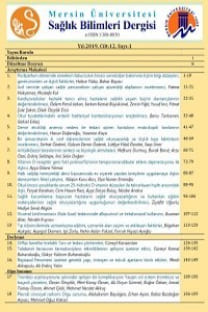Bir aile sağlığı merkezine başvuran yaşlı bireylerde depresyon sıklığı ve yaşam doyumunun değerlendirilmesi
Amaç: Çalışmanın amacı bir aile sağlığı merkezine başvuran yaşlı bireylerdeki depresyon görülme olasılığı ile genel yaşam doyumu düzeyleri ve ilişkili faktörlerin değerlendirilmesidir. Yöntem: Çalışma 15 Aralık 2015 – 15 Ocak 2016 tarihleri arasında İstanbul ilinde hizmet veren bir aile sağlığı merkezinde yapılmıştır. Çalışmaya katılmayı kabul eden yaşlı bireylere araştırmacı tarafından hazırlanmış 25 soru içeren bir sosyo-demografik anket formu, Geriatrik Depresyon Ölçeği ve Yaşam Doyumu Ölçeği uygulanmıştır. Anketler yüz yüze görüşme tekniği ile uygulanmıştır. Verilerin analizinde SPSS (Statistical Program for Social Sciences) sürüm 15.0 istatistik programı kullanılmıştır. Verilerin değerlendirilmesinde tanımlayıcı istatistiksel metotlar (sayı, yüzde, ortalama, standart sapma) kullanılmıştır. Bulgular: Çalışmaya katılanların %62.2’i kadın, yaş ortalaması 66.32±6.43 tür. Yaşlıların depresyon puan ortalaması 12.08±8.49 olup olası depresyon tespit edilmiştir. Depresyon puan ortalamaları ile cinsiyet, medeni durumu, eğitim durumu, çocuk sayısı, kronik hastalık durumu ve sıkıntıyla baş etme durumu arasında istatistiksel olarak anlamlılık tespit edilmiştir (p<0.05). Araştırmaya katılan yaşlıların “yaşam doyumu” düşük (4.92±1.56) olarak saptanmıştır. Yaşam doyumu puan ortalamaları ile cinsiyet, medeni durumu, eğitim durumu, çocuk sayısı, kronik hastalık durumu ve sıkıntıyla baş etme durumu arasında istatistiksel olarak anlamlılık saptanmıştır. Sonuç: Araştırmaya katılan yaşlılarda olası depresyon ve düşük yaşam doyumu tespit edilmiştir. Yaşlılık zor bir dönem olmasına karşın, psikososyal desteğin sağlanması ile yaşanan sorunların en aza indirgenmesi, depresyon görülme olasılığının azaltılması ve yaşam doyumlarının artırılması sağlanabilir.
Anahtar Kelimeler:
Aile sağlığı merkezi, depresyon hastalığı, yaşlı, yaşam doyumu
Evaluation of life satisfaction & depression prevalence in elderly patients administered to a family health center
Objective: The aim of this study is to evaluate the prevalence of depression, general life satisfaction levels and related factors in the elderly patients administered to a Family Health Center. Method: This study was conducted in a Family Health Center in Istanbul between the 15th of December 2015 and the 15th January 2016. A socio-demographic questionnaire of 25 questions, Geriatric Depression Scale, and Life Satisfaction Scale were applied by the researchers to those elderly patients in agreement with participation to the study. The surveys were conducted by face to face interviews. Data were analyzed by SPSS (Statistical Program For Social Sciences) version 15.0 statistical software. Descriptive statistical methods were used for evaluation of the data (number, percentage, mean, standard deviation) is used. Results: Of the participants, 37.8% were male and 62.2% were female. The mean age was 66.32 ± 6:43 years. The mean depression score of elderly was found to be 12:08 ± 8:49, indicating a potential of developing depression. A significant correlation among the mean depression score gender, marital status, education level, number of children, having a chronic disease and the ways of coping with hardship cases was determined (p<0.05). The mean “life satisfaction” score (4.92±1.56) was found as low for those elderly participants in this study. In addition, a significant difference was determined among mean life satisfaction scores and gender, marital status, education level, number of children, chronic illness and distress coping status. Conclusion: Among elderly participants, potential of developing depression and lower life satisfaction were identified. Although elderly life frame is a difficult period, it might be possible to minimize experienced problems, prevalence of depression, and to improve life satisfaction by psychological support.
- Yayın Aralığı: 3
- Başlangıç: 2008
- Yayıncı: Mersin Üniversitesi Sağlık Bilimleri Enstitüsü
